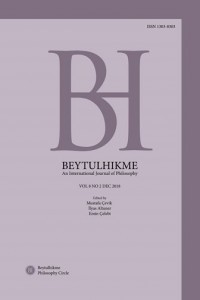Abstract
In the standard theory of probability, developed by Kolmogorov, the concept of conditional probability is defined with what is known as the ratio formula: the probability of A given B is the ratio between the probability of A and B and the probability of B, i.e. P(A|B)= (P(AB))/(P(B)). Clearly, this ratio is not defined when the probability of the condition, P(B), is 0. According to Popper, this problem, which is known as the zero-denominator problem, shows a serious conceptual shortcoming of the standard Kolmogorovian theory of probability. In order to overcome this shortcoming, Popper developed an alternative axiomatic theory of probability where conditional probability is taken as primitive. It should be noted that this axiomatic probability theory is different than and independent from Popper’s philosophy of probability which is based on the propensity approach. Popper claims that his axiomatic theory is a better fit for the use of probability in the philosophy of science and statistics. Based on this claim, it is often stated that Popper’s theory is conceptually superior to Kolmogorov’s theory. The ultimate aim of this paper is to evaluate this claim by analyzing Popper’s axiomatic theory within the context of the zero-denominator problem.
References
- Briggs, R. (2010). The Metaphysics of Chance. Philosophy Compass, 5 (11), 938–952.
- Carnap, R. (1971). A Basic System of Inductive Logic, Part I. Studies in Inductive Logic and Probability. (Ed. R. Carnap & R. C. Jeffrey). California: University of California Press, 33-165.
- Fitelson, B. & Hájek, A. (2017). Declarations of Independence. Synthese, 194, 3979-3995.
- Hájek, A. (2003). What Conditional Probability Could Not Be’ Synthese, 137, 273-323.
- Hájek, A. (2010). A Plea for the Improbable. AAP presidential address.
- Hammond, P. J. (1999). Non-Archimedean Subjective Probabilities in Decision Theory and Games. Mathematical Social Sciences, 38 (2), 139-156
- Kolmogorov, A. N. (1933/1956) Grundbegriffe der Wahrscheinlichkeitrechnung, Ergebnisse Der Mathematik. Trans. Foundations of the Theory of Probability. New York: Chelsea Publishing Company.
- Lowe, E. J. (1996). Conditional Probability and Conditional Beliefs. Mind, 105, 603–15.
- Popper, K. (1955). Two Autonomous Axiom System for the Calculus of Probabilities. British Journal for the Philosophy of Science, 21, 51-57.
- Popper, K. (1959). The Logic of Scientific Discovery, London & New York: Basic Books.
- Leblanc, H. (1989). The Autonomy of Probability Theory (Notes on Kolmogorov, Rényi, and Popper). British Journal for the Philosophy of Science, 40 (2), 167-181
- Lowe, E. J. (2008). What is ‘Conditional Probability’? Analysis, 299, 218-223.
- Renyi, A. (1970). Foundations of Probability. San Francisco: Holden-Day.
- Salmon, W. (1966). The Foundations of Scientific Inference. Pittsburgh: University of Pittsburgh Press.
- Von Wright, G. (1960). A Treatise on Induction and Probability. New Jersey: Little-field, Adams & Co.
Abstract
References
- Briggs, R. (2010). The Metaphysics of Chance. Philosophy Compass, 5 (11), 938–952.
- Carnap, R. (1971). A Basic System of Inductive Logic, Part I. Studies in Inductive Logic and Probability. (Ed. R. Carnap & R. C. Jeffrey). California: University of California Press, 33-165.
- Fitelson, B. & Hájek, A. (2017). Declarations of Independence. Synthese, 194, 3979-3995.
- Hájek, A. (2003). What Conditional Probability Could Not Be’ Synthese, 137, 273-323.
- Hájek, A. (2010). A Plea for the Improbable. AAP presidential address.
- Hammond, P. J. (1999). Non-Archimedean Subjective Probabilities in Decision Theory and Games. Mathematical Social Sciences, 38 (2), 139-156
- Kolmogorov, A. N. (1933/1956) Grundbegriffe der Wahrscheinlichkeitrechnung, Ergebnisse Der Mathematik. Trans. Foundations of the Theory of Probability. New York: Chelsea Publishing Company.
- Lowe, E. J. (1996). Conditional Probability and Conditional Beliefs. Mind, 105, 603–15.
- Popper, K. (1955). Two Autonomous Axiom System for the Calculus of Probabilities. British Journal for the Philosophy of Science, 21, 51-57.
- Popper, K. (1959). The Logic of Scientific Discovery, London & New York: Basic Books.
- Leblanc, H. (1989). The Autonomy of Probability Theory (Notes on Kolmogorov, Rényi, and Popper). British Journal for the Philosophy of Science, 40 (2), 167-181
- Lowe, E. J. (2008). What is ‘Conditional Probability’? Analysis, 299, 218-223.
- Renyi, A. (1970). Foundations of Probability. San Francisco: Holden-Day.
- Salmon, W. (1966). The Foundations of Scientific Inference. Pittsburgh: University of Pittsburgh Press.
- Von Wright, G. (1960). A Treatise on Induction and Probability. New Jersey: Little-field, Adams & Co.
Details
| Primary Language | English |
|---|---|
| Subjects | Philosophy |
| Journal Section | Articles |
| Authors | |
| Publication Date | December 30, 2018 |
| Published in Issue | Year 2018 Volume: 8 Issue: 2 |


